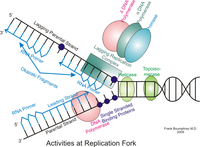
Photo from wikipedia
Timely and complete replication of the genome is essential for life. The PCNA ring plays an essential role in DNA replication and repair by contributing to the processivity of DNA… Click to show full abstract
Timely and complete replication of the genome is essential for life. The PCNA ring plays an essential role in DNA replication and repair by contributing to the processivity of DNA polymerases and by recruiting proteins that act in DNA replication-associated processes. The ELG1 gene encodes a protein that works, together with the Rfc2-5 subunits (shared by the replication factor C complex), to unload PCNA from chromatin. While ELG1 is not essential for life, deletion of the gene has strong consequences for the stability of the genome, and elg1 mutants exhibit sensitivity to DNA damaging agents, defects in genomic silencing, high mutation rates, and other striking phenotypes. Here, we sought to understand whether all the roles attributed to Elg1 in genome stability maintenance are due to its effects on PCNA unloading, or whether they are due to additional functions of the protein. By using a battery of mutants that affect PCNA accumulation at various degrees, we show that all the phenotypes measured correlate with the amount of PCNA left at the chromatin. Our results thus demonstrate the importance of Elg1 and of PCNA unloading in promoting proper chromatin structure and in maintaining a stable genome.
Journal Title: International Journal of Molecular Sciences
Year Published: 2023
Link to full text (if available)
Share on Social Media: Sign Up to like & get
recommendations!